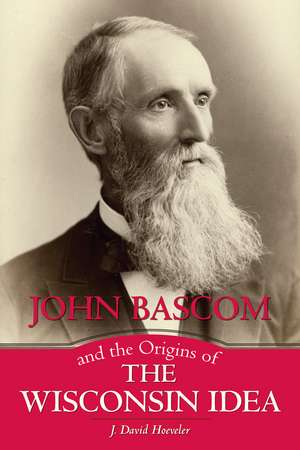John Bascom and the Origins of the Wisconsin Idea
Autor J. David Hoeveleren Limba Engleză Paperback – 11 sep 2017
In the Progressive Era of American history, the state of Wisconsin gained national attention for its innovative economic and political reforms. Amidst this ferment, the "Wisconsin Idea" was popularized—the idea that a public university should improve the lives of people beyond the borders of its campus.
During his term as governor (1901–1906), Robert La Follette routinely consulted with University of Wisconsin researchers to devise groundbreaking programs and legislation. Although the Wisconsin Idea is often attributed to a 1904 speech by Charles Van Hise, then president of the University of Wisconsin, David Hoeveler argues that it originated decades earlier, in the creative and fertile mind of John Bascom.
A philosopher, theologian, and sociologist, Bascom (1827–1922) deeply influenced a generation of students at the University of Wisconsin, including La Follette and Van Hise. Hoeveler documents how Bascom drew concepts from German idealism, liberal Protestantism, and evolutionary theory, transforming them into advocacy for social and political reform. He was a champion of temperance, women's rights, and labor, all of which brought him controversy as president of the university from 1874 to 1887. In a way unmatched by any of his peers at other institutions, Bascom outlined a social gospel that called for an expanded role for state governments and universities as agencies of moral improvement.
Hoeveler traces the intellectual history of the Wisconsin Idea from the nineteenth century to such influential Progressive Era thinkers as Richard T. Ely and John R. Commons, who believed university researchers should be a vital source of expertise for government and citizens.
During his term as governor (1901–1906), Robert La Follette routinely consulted with University of Wisconsin researchers to devise groundbreaking programs and legislation. Although the Wisconsin Idea is often attributed to a 1904 speech by Charles Van Hise, then president of the University of Wisconsin, David Hoeveler argues that it originated decades earlier, in the creative and fertile mind of John Bascom.
A philosopher, theologian, and sociologist, Bascom (1827–1922) deeply influenced a generation of students at the University of Wisconsin, including La Follette and Van Hise. Hoeveler documents how Bascom drew concepts from German idealism, liberal Protestantism, and evolutionary theory, transforming them into advocacy for social and political reform. He was a champion of temperance, women's rights, and labor, all of which brought him controversy as president of the university from 1874 to 1887. In a way unmatched by any of his peers at other institutions, Bascom outlined a social gospel that called for an expanded role for state governments and universities as agencies of moral improvement.
Hoeveler traces the intellectual history of the Wisconsin Idea from the nineteenth century to such influential Progressive Era thinkers as Richard T. Ely and John R. Commons, who believed university researchers should be a vital source of expertise for government and citizens.
Preț: 175.12 lei
Nou
Puncte Express: 263
Preț estimativ în valută:
33.51€ • 34.62$ • 27.89£
33.51€ • 34.62$ • 27.89£
Carte tipărită la comandă
Livrare economică 26 martie-09 aprilie
Preluare comenzi: 021 569.72.76
Specificații
ISBN-13: 9780299307844
ISBN-10: 0299307840
Pagini: 248
Ilustrații: 9 b-w illus.
Dimensiuni: 152 x 229 x 20 mm
Greutate: 0.66 kg
Editura: University of Wisconsin Press
Colecția University of Wisconsin Press
ISBN-10: 0299307840
Pagini: 248
Ilustrații: 9 b-w illus.
Dimensiuni: 152 x 229 x 20 mm
Greutate: 0.66 kg
Editura: University of Wisconsin Press
Colecția University of Wisconsin Press
Recenzii
"Identifies the philosopher, theologian, and sociologist [John Bascom] as the originator of the notion of the 'Wisconsin Idea,' or the idea that public universities should benefit people beyond the borders of a campus." —Chronicle of Higher Education
"A satisfying biography for anyone interested in progressive politics, nineteenth-century intellectual thought, or university history." —Michigan Historical Review
"As we face contemporary privatization trends that undermine higher education as a public good, the book serves as a reminder of the powerful ideas that nurtured the land-grant college promises of democratic service and state engagement. Hoeveler has a magisterial command of intellectual movements that resist generalization and that demand readers wrestle with nuance and complexity." —History of Education Quarterly
Notă biografică
J. David Hoeveler is a Distinguished Professor of History at the University of Wisconsin–Milwaukee. He is the author of seven books, including Creating the American Mind, The Evolutionists, and Watch on the Right.
Cuprins
List of Illustrations
Acknowledgments
Introduction
1 Preparations
2 A Political Professor
3 Wisconsin: A State and Its University
4 New Theology, New University
5 The University and the Social Gospel
6 Progressivism 1: Temperance
7 Progressivism 2: Women
8 Progressivism 3: Money and Class
9 The Wisconsin Idea
Postscript
Notes
A Bascom Bibliography
Index
Descriere
In the Progressive Era of American history, the state of Wisconsin gained national attention for its innovative economic and political reforms. Amidst this ferment, John Bascom popularized the "Wisconsin Idea"—the notion that a public university should improve the lives of people beyond the borders of its campus.
